Are you looking for something to replace white vinegar in your kitchen
Whether it’s because of allergies or general taste preference, trying out different alternatives can help keep your food exciting.
Luckily, there are lots of options available when it comes to finding substitutions for white vinegar.
From citrus juices and sauces to various types of vinegars, here are the 7 best substitutes for white vinegar that you should try!
What’s White Vinegar?

White vinegar is a type of vinegar that is made from grain, usually wheat.
It has a slightly acidic taste and is often used in cooking as a flavor enhancer or preservative.
It can also be used for cleaning purposes.
White vinegar has a long history dating back to ancient times.
It was first used as a food preservative and later for its medicinal properties.
White vinegar is still used today for both culinary and cleaning purposes.
The vinegar has a sharp, acidic taste.
It is also clear in color and has a water-like consistency.
White vinegar is often used in cooking to enhance flavors or preserve food.
It can also be used for cleaning purposes.
This vinegar is a versatile ingredient that can be used in many different ways.
Whether you’re using it for cooking or cleaning, white vinegar is an excellent choice.
7 Best Substitutes for White Vinegar You Should Try
1. Apple Cider Vinegar
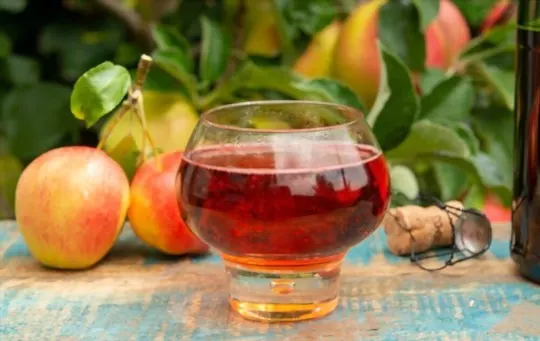
Apple cider vinegar is a great substitute for white vinegar.
It has a similar taste but is slightly sweeter.
You can use it in all the same ways you would use white vinegar, such as in salad dressings, marinades, and cleaning solutions.
To substitute apple cider vinegar for white vinegar, simply use the same amount of apple cider vinegar as you would white vinegar.
So, if a recipe calls for 1 tablespoon of white vinegar, use 1 tablespoon of apple cider vinegar instead.
Easy peasy.
2. Lemon Juice
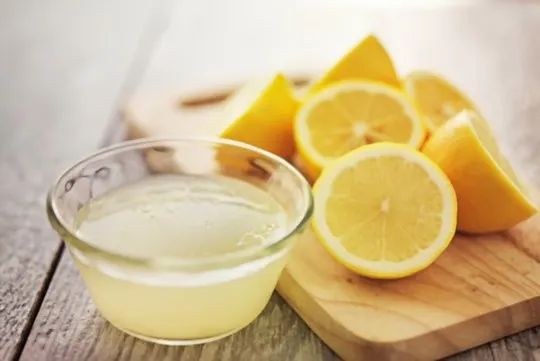
Lemon juice is another great substitute for white vinegar.
Like apple cider vinegar, it has a similar taste but is slightly sweeter.
You can use it in all the same ways you would use white vinegar, such as in salad dressings, marinades, and cleaning solutions.
To substitute lemon juice for white vinegar, mix 1 part lemon juice with 2 parts water.
So, if a recipe calls for 1 tablespoon of white vinegar, use 2 tablespoons of lemon juice mixed with 2 tablespoons of water.
2. Rice Vinegar
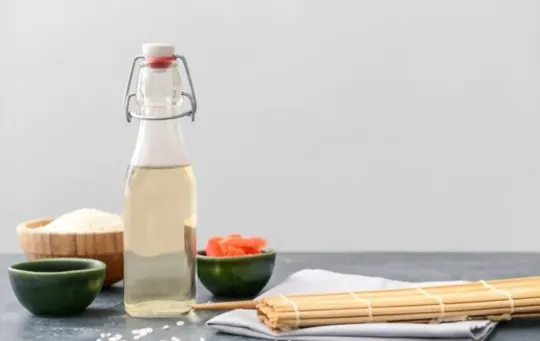
Rice vinegar is a type of vinegar made from rice that has been fermented.
It is used in a variety of cuisines, including Chinese, Japanese, and Korean.
Rice vinegar has a milder flavor than other types of vinegar, making it a good choice for those who are sensitive to the strong taste of vinegar.
Rice vinegar can be used as a substitute for white vinegar in most recipes.
When substituting rice vinegar for white vinegar, use an equal amount of rice vinegar as you would white vinegar.
You may need to adjust the amount of rice vinegar depending on the recipe and your personal preferences.
If you’re looking for a substitution for white vinegar that will add a bit of sweetness to your dish, then rice vinegar is a good choice.
Keep in mind that the flavor of rice vinegar is much milder than other types of vinegar, so you may need to use more or less depending on your personal preferences.
3. White Wine Vinegar
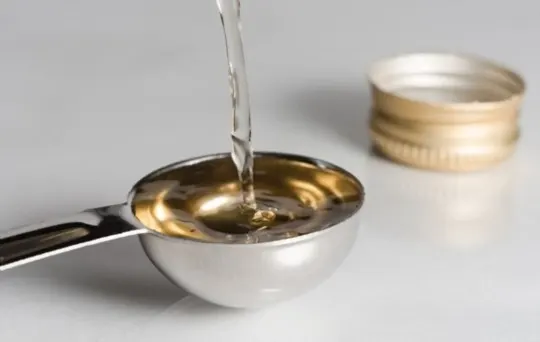
White wine vinegar is a type of vinegar made from white wine.
It has a milder, more delicate flavor than other types of vinegar, making it ideal for certain recipes.
White wine vinegar can be used in place of white vinegar in most recipes.
The taste of white wine vinegar is slightly acidic with a hint of sweetness.
It is not as harsh as other types of vinegar, making it ideal for use in salad dressings and marinades.
White wine vinegar can also be used to clean coffee makers and windows.
To substitute white wine vinegar for white vinegar, simply use an equal amount of white wine vinegar in place of the white vinegar called for in the recipe.
4. Champagne Vinegar
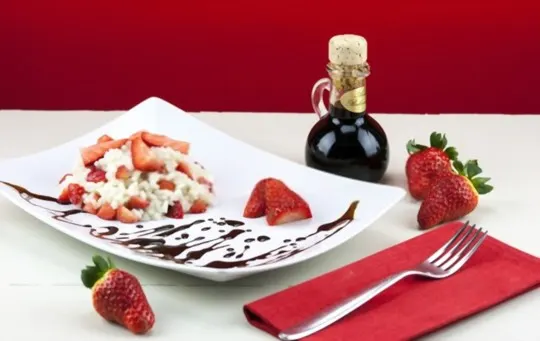
If you’re looking for vinegar with a slightly sweeter taste, then champagne vinegar is a great substitute for white vinegar.
It’s made from fermented champagne and has a light, fruity flavor.
It’s also very versatile – you can use it in salad dressings, marinades, and even baking.
When substituting champagne vinegar for white vinegar, keep in mind that it is slightly sweeter.
You may want to adjust the other ingredients in your recipe accordingly.
For example, if you’re using it in a salad dressing, you may want to add a little less sugar.
Champagne vinegar is a great way to add a little extra flavor to your cooking.
So next time you’re out of white vinegar, don’t worry – just grab a bottle of champagne vinegar and give it a try.
5. Malt Vinegar

Malt vinegar is a type of vinegar that is made from barley.
It has a dark brown color and a strong, distinct flavor.
Malt vinegar is commonly used in fish and chips recipes, as well as in pickling recipes.
The taste of malt vinegar is quite strong and sharp.
It is not as sweet as white vinegar, but it does have a slightly malty flavor.
If you are substituting malt vinegar for white vinegar, you may want to use a little less than the recipe calls for.
Malt vinegar can be substituted for white vinegar in most recipes.
The flavor will be slightly different, but it will not affect the overall taste of the dish.
6. Balsamic Vinegar
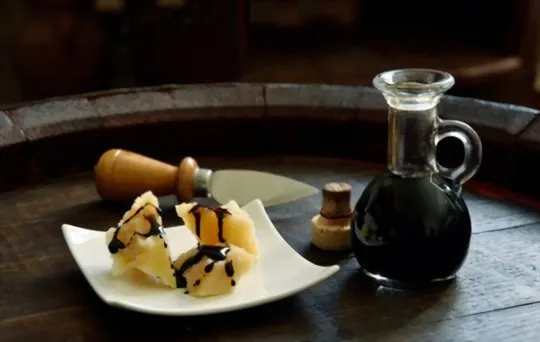
Balsamic vinegar is a type of vinegar that is made from grape juice that has been cooked down and then aged in wooden barrels.
The taste of balsamic vinegar is very rich and sweet, with a slightly smoky flavor.
It can be used as a substitute for white vinegar in many recipes.
When substituting balsamic vinegar for white vinegar, it is important to keep the following in mind:
- Balsamic vinegar is much sweeter than white vinegar, so you may want to use less of it in your recipe.
- Balsamic vinegar also has a stronger flavor, so it can easily overpower other ingredients in your recipe. If you are using it in a marinade or salad dressing, you may want to add more oil to balance out the flavors.
- Balsamic vinegar can darken light-colored foods, so it is not ideal for use in dishes where you want to maintain the original color of the ingredients.
7. Red Wine Vinegar
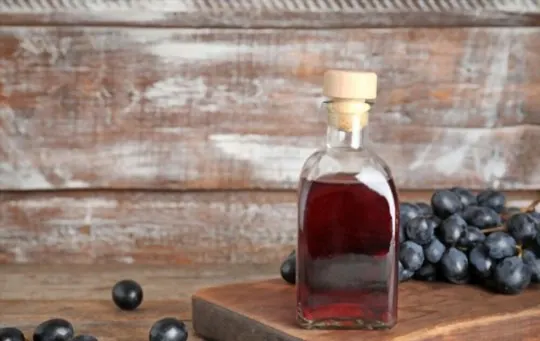
Red wine vinegar is a type of vinegar that is made from red wine.
The taste of red wine vinegar is tart and acidic.
It can be used as a substitute for white vinegar in many recipes.
Red wine vinegar has a strong, tart flavor that can be used in place of white vinegar.
It is a good choice for salad dressings, marinades, and sauces.
When substituting red wine vinegar for white vinegar, use less than you would white vinegar because it is more potent.
Red wine vinegar can also be used to add acidity to dishes such as stews and braised meats.
When using red wine vinegar as a substitute for white vinegar, use half the amount of red wine vinegar as you would white vinegar.
Conclusion
We’ve gone over 7 of the best substitutes for white vinegar.
Each of these vinegar has a unique taste that can enhance the flavor of your dish.
When substituting white vinegar for another type of vinegar, it’s important to keep in mind the acidity level of the vinegar.
White vinegar is one of the most versatile and commonly used vinegar, so it’s good to have a few different substitutes on hand.
I hope this blog post has been helpful in finding the best substitutes for white vinegar for your needs.
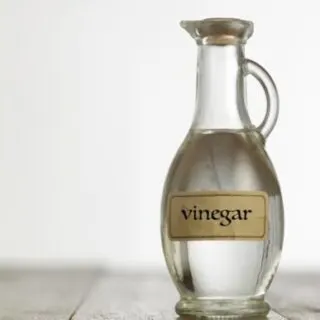
7 Best Substitutes for White Vinegar You Should Try
Ingredients
- 1. Apple Cider Vinegar
- 2. Lemon Juice
- 2. Rice Vinegar
- 3. White Wine Vinegar
- 4. Champagne Vinegar
- 5. Malt Vinegar
- 6. Balsamic Vinegar
- 7. Red Wine Vinegar
Instructions
- Select your favorite ingredient from the list above to use as a substitute.
- Follow the instructions and use the exact ratio of ingredients as directed.
- This will help to ensure that your dish turns out just as delicious as it would have with the original ingredient.

Carrie is a food writer and editor with more than 15 years of experience. She has worked for some of the biggest names in the food industry, including Bon Appétit, Food & Wine, and Martha Stewart Living.
As the Editor in Chief of IntroChicago.com, Carrie oversees all of the content on the site. She also manages the team of contributing writers and editors, who help to create delicious recipes, helpful tips, and informative articles that you’ll find on the site.
A native of the Chicago area, Carrie is passionate about all things food. She loves trying new restaurants and experimenting with new recipes in her kitchen. She’s also a graduate of the Culinary Institute of America, so she knows a thing or two about food!
